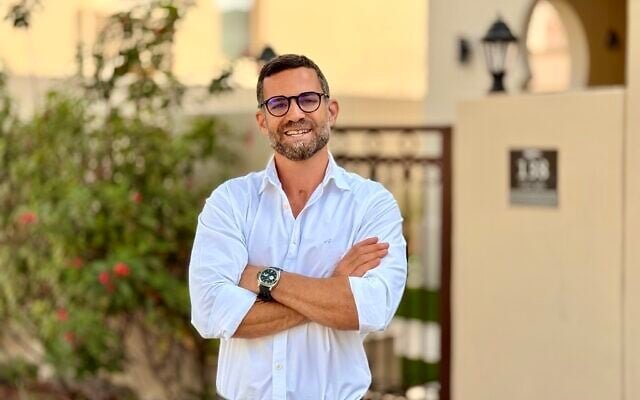DUBAI — Israelis continue to capitalize on investment opportunities in the United Arab Emirates’ most populous city, where property sells for roughly half as much as in Tel Aviv, even as the war in Gaza puts a damper on newly-established relations between the UAE and the Jewish state.
Idan Doodman lives in Dubai with his family and is working with Israeli investors — both in the UAE and in Israel — who are keen to take advantage of the opportunities opened by the 2020 US-brokered Abraham Accords and the Emirates’ reputation as a tax haven.
“The ones living in Israel have heard about the high return on investment they get from real estate in Dubai like no other place,” Doodman told The Times of Israel. “There has been a snowball effect with word of mouth, but many of the businesspeople have been in Dubai and have figured this opportunity out for themselves.”
For those looking to rent out apartments as a long-term investment, annual returns are between 6-9%, depending on the area, the quality of the property and the amenities.
But unlike Tel Aviv, almost all modern buildings in Dubai are equipped with conveniences such as swimming pools and gyms — a level of luxury and accessibility far surpassing that in Israel. Higher-end developers such as Ellington and Emaar even offer separate children’s clubs and pools.
“Investors don’t want to flip and sell. This feels more secure for them and is probably the most low-risk for investors in the Dubai market,” added Doodman, who said the most popular areas he recommends are Jumeirah Village Circle (also known as JVC), Dubai Marina, Downtown Dubai and Business Bay.
While most buyers are taking one- or two-bedroom apartments, which range between NIS 1-2 million ($279,000-$258,000), rental returns are between NIS 110,000-120,000 ($30,000-$33,000) annually, before deducting for costs such as monthly building service fees. “We can rent these out very quickly with a great yield,” said Doodman.
In areas such as Noga, a gentrifying neighborhood in south Tel Aviv, a two-bedroom apartment with no facilities is being sold for NIS 5-6 million ($1.4-1.7 million), with rents as low as NIS 120,000 per year.
With Dubai’s growing shortage of villas, there is also an opportunity for those willing to invest more.
“Mainly, investors are buying apartments, although there is a high benefit to buying a villa or townhouse as the demand will now be even higher because a lot of families from all over the world are coming, and there is a short supply of those,” Doodman said.
In reality, the Gaza war, Doodman said, has “slowed things down a little. Some investors have held back, but for those with another passport [besides Israeli], they were able to continue and feel more secure.”
Eyal Ashur, a young Israeli agent now based in Dubai, said the return on investment has lured many Israelis from all social segments, hoping to get a profitable return in the tax haven.
“If you’re doing the same in Tel Aviv you’re lucky to get 3%, whereas in Dubai it’s at minimum 5-6%,” he said.
Most of Ashur’s clients, as with Doodman’s, invest between NIS 1-2 million for studios to two-bedroom apartments, with all the capital gain tax-free in UAE (but not necessarily in Israel).
“Israelis love JVC and Business Bay. I would always advise clients to stop investing in JVC and look more toward places like, for example, The Valley by Emaar,” Ashur said, referring to a luxurious gated community on the city’s southeastern outskirts.
“There is a big shortage of townhouses in Dubai,” Ashur said. “I would also advise investing in District One or Creek Harbour, but mostly, it’s a bit above budget. If I have a big investor, I would suggest investing in the Jumeirah coastline, but they’re very different numbers.”
There are natural concerns, Ashur said, in the midst of the war and in the wake of the kidnapping and murder of Rabbi Zvi Kogen last November, a Chabad rabbi whose death shook the community. But as a millionaires’ playground, the UAE remains a safe place to invest, Ashur said.
“The UAE is a safe haven for everybody,” said Ashur. “If they will exclude one group of people, others will start to have shaky thoughts about the UAE. Millionaires from all over the world are coming here.”
Last May, Henley & Partners, which tracks private wealth and investment migration, said Dubai contains the Middle East’s highest concentration of resident millionaires with 72,500, ranking it as the 21st wealthiest city in the world.
“So when people speak to me about the peace agreement falling apart, I don’t think that will happen,” said Ashur. “If [the UAE] ends that treaty and Israelis have problems with their money, what are the Russians, the Iranians, the Pakistanis, going to think? There is always a group of people who could think maybe we will be next. It can create a domino effect. That’s why I believe in the UAE.”
It’s not just the high net-worth investors who are keen to jump on board — average Israelis are using their NIS 1 million nest eggs to buy properties in Dubai, while an identical sum would barely constitute a deposit in Tel Aviv.
But the concerns are understandable amid the worst times for Israel in recent history and the longest war in Israel’s history.
“In times of fear, recession, despair, everyone is more reserved,” Ashur said. “You can understand that and there’s a war, so you want to keep your reserves at hand.”
